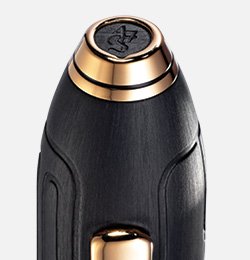Peter Thum is an unusual entrepreneur. A 1990 graduate of California’s Claremont McKenna College, he was working in South Africa in 2001 on a project for McKinsey & Company when he had an epiphany. Many of the people he was meeting lacked clean drinking water. So in 2002, Thum founded a bottled water brand called Ethos; five cents from the sale of every bottle funded water projects in water-stressed countries.

Starbucks bought Ethos Water in 2005, and Thum turned his attention to another acute African problem: the ubiquity of illicit guns, particularly AK-47s, in regional conflicts. He launched Fonderie 47, a startup whose mission was to remove illicit assault rifles from war-torn areas and turn them into jewelry, watches, accessories and art. The guns came from the rangers of Virunga National Park, which is in the Democratic Republic of the Congo and borders Uganda and Rwanda. Particularly since the Rwandan genocide of 1994, the region has been rife with violence, and the park rangers confiscated the guns from combatants and poachers. Thum bought the assault weapons from rangers, had a local blacksmith melt them down and transported the resulting steel back to the States in his luggage. He enlisted high-end designers to turn it into watches and jewelry; one such watch, a limited edition of 20 pieces, sells for $195,000. Its purchase enables the destruction of 1,000 assault rifles. “No one had ever done anything like this before,” Thum says. “We had to create a brand that convinced people there was value in objects made from and enabling the destruction of guns.”
Fonderie 47 has helped take over 70,000 illicit weapons out of circulation, a remarkable achievement. But Thum worried—was the elite nature of his products (average price, $80,000) limiting the impact of his mission?

Then, in 2015, Thum talked to Doug Mellinger, a friend of his who happens to work at Clarion Capital Partners, the private equity firm that bought pen maker Cross in 2013. “You should talk to Cross,” Mellinger said.
That chance conversation led to the creation of the Peerless Fonderie 47, a $350 pen from Cross. (There’s also an 18-karat gold limited-edition version for $4,700.) “After we met Peter, we instantly recognized the potential of combining his passion with our pens,” says Cross CEO Robert Baird.
For Thum, Cross represented an opportunity to expand the Fonderie 47 brand. “In relative terms, Cross is making extremely expensive, luxury pens,” says Thum. “But at $350 they are significantly more accessible than Fonderie 47’s other products.”
Ramon Kingsley, Cross’ chief designer, sat with Thum to fashion a pen that would invoke its AK-47 origin. Thum had brought a gun part, and Kingsley held it to get a feel for the material, the essence of the thing—what made it at once seductive and horrific.
Fonderie 47 has helped take over 70,000 illicit weapons out of circulation, a remarkable achievement.
“Fonderie 47 uses the steel in its pieces like we use gemstones. So we incorporated the gun steel in this fashion,” Kingsley says. Using the wide barrel shape of Cross’ existing Peerless pen line, Kingsley created a pen made of brass and steel parts coated in black PVD with 23-karat gold-plated appointments. The gun barrel is suggested by thin lines chemically etched into the pen barrel. Embedded in the conical top is a small circle of black steel that does come from an African AK-47. It is imprinted with Fonderie 47’s logo, the letter F entwined with the number 47. And finally, on the back of the pen’s top there is a serial number. Each number corresponds with a gun purchased and destroyed by Fonderie 47. “It’s a powerful call to action,” says Baird. “For every pen you buy, an assault weapon is destroyed.”
The Peerless Fonderie 47 is an elegant instrument, and reception to it from both collectors and noncollectors has been extremely positive. Some buyers like its sleek design, Baird says, while others say they have plenty of pens but want to support the mission behind this one. “The pen,” Baird notes, “is mightier than the gun.”
